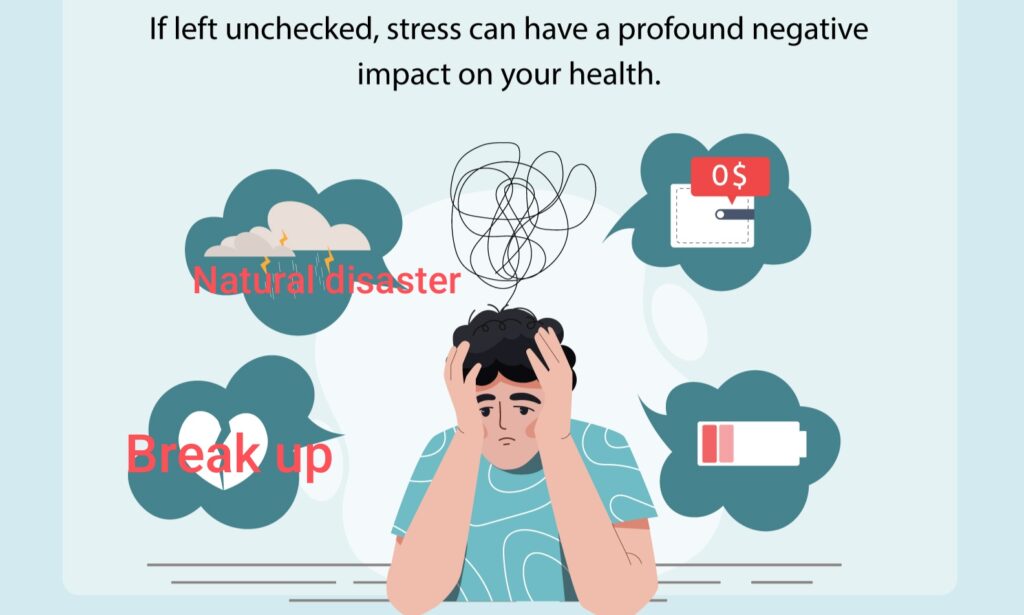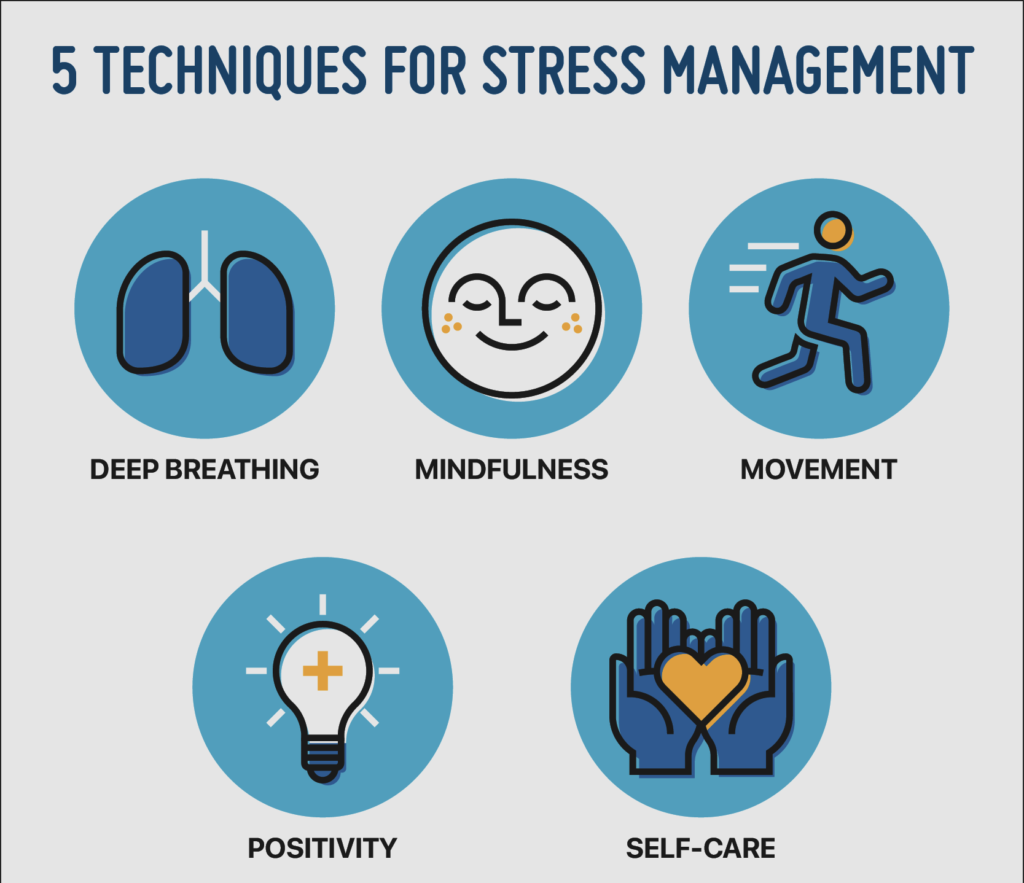Impact of Stress on physical health, Managing stress for physical health, 5 steps for stress management
Stress
Stress is something that we all deal with in our daily lives. Whether it’s trying to meet a work deadline, handling financial concerns, juggling family obligations, or even worrying about your own health, stress can show up in so many different ways. While a little bit of stress can help us rise to challenges, too much of it over a long period can seriously affect your physical health.
How Stress Affects Your Physical Health
When you’re stressed, your body goes into “fight or flight” mode, releasing hormones like cortisol and adrenaline. While these hormones can help you handle short-term situations, chronic stress can lead to a variety of health problems.
- Heart Health
If you’re stressed all time, your heart is likely feeling it too. Chronic stress can raise your blood pressure and increase the chances of heart attacks or strokes. The constant flood of stress hormones can wear down your heart and blood vessels over time. - Weakened Immune System
Stress makes your immune system weaker, meaning you’re more likely to catch colds, infections, or other illnesses. It also slows down the body’s healing process, so if you do get sick or injured, recovery can take longer than usual. - Digestive Problems
Ever notice how your stomach feels when you’re really stressed? Stress can mess with your digestion, leading to issues like irritable bowel syndrome (IBS), acid reflux, or even ulcers. You might also find yourself eating more or less than usual, which can affect how well your digestive system functions. - Sleep Issues
Stress is a major issue when it comes to sleep problems like insomnia. The trouble is, that lack of sleep can make it even worse, leading to a never-ending cycle of exhaustion.https://nutrimedix.online/role-of-sleep-5-ways-to-improve-sleep-quality/ - Muscle Pain
When you’re stressed, your muscles tense up, leading to aches and pains, especially in your neck, shoulders, and back. Chronic stress can even trigger tension headaches or migraines. - https://nutrimedix.online/mental-health-and-5-steps-to-improve-it/
- Weight Fluctuations
Stress can throw your eating habits out of whack. Some people eat more (stress eating), while others completely lose their appetite. Both extremes can lead to unhealthy weight changes over time.

Managing Stress for Better Physical Health
The good news is that there are plenty of ways to manage stress and keep it from affecting your physical health. Here are a few strategies you can try:
- Exercise Regularly
Moving your body is one of the best ways to relieve stress. Exercise releases endorphins, the “feel-good” chemicals in your brain, which can help improve your mood and reduce anxiety. Whether it’s a walk in the park, a run, or a yoga class, regular physical activity can do wonders for your stress levels and overall health. - Practice Mindfulness
Mindfulness techniques like meditation, deep breathing, or even progressive muscle relaxation can calm your mind and body. These practices help you manage your stress response, so you’re not always in “fight or flight” mode. - Prioritize Sleep
Getting enough rest is crucial for managing stress. Aim for 7-9 hours of sleep a night to allow your body to recover and reset. Try to create a relaxing bedtime routine, avoid screens before bed, and limit caffeine in the evening. - Eat a Balanced Diet
What you eat can directly impact how you feel. A diet rich in whole grains, lean proteins, fruits, and vegetables can help stabilize your mood and energy levels. Try to avoid processed foods, sugary snacks, and excessive caffeine, which can make stress and anxiety worse. - Set Boundaries
Sometimes, stress comes from taking on too much. Learning to say no and setting healthy boundaries can help you maintain balance. It’s okay to delegate tasks or take a break without feeling guilty. - Stay Connected
Talking to someone—whether it’s a friend, family member, or therapist—can be incredibly helpful when you’re feeling overwhelmed. Social support can help you feel less isolated and more capable of managing stress. - Manage Your Time
Feeling overwhelmed often comes from poor time management. Try breaking down your tasks into smaller, manageable steps. Make time for breaks and self-care so you don’t burn out. - Enjoy a Hobby
Doing something you love can help take your mind off stress. Whether it’s painting, gardening, reading, or just spending time outside, engaging in hobbies is a great way to relax.
5 Techniques for Stress Management
Get Organized: Manage your time by breaking tasks into smaller steps and setting realistic goals.
Take Deep Breaths: Focus on slow, deep breaths to calm your mind and body.
Relax Your Muscles: Tense and then relax muscle groups to reduce physical tension.
Be Mindful: Practice mindfulness or meditation to stay in the present and clear stressful thoughts.
Move Your Body: Physical activities like walking or stretching release endorphins and reduce stress.
Be happy: focus on good things, and ignore negative thoughts, happiness is the key for stress management.

Conclusion
Stress can really take a toll on your body, causing things like headaches, high blood pressure, a weakened immune system, and even trouble sleeping. Over time, it can lead to more serious health problems, like heart disease. But the good news is, you can manage it. Simple techniques like deep breathing, staying active, practicing mindfulness, and staying organized can help keep stress in check. Taking these steps regularly not only helps you feel better mentally, but it also protects your physical health in the long run.

